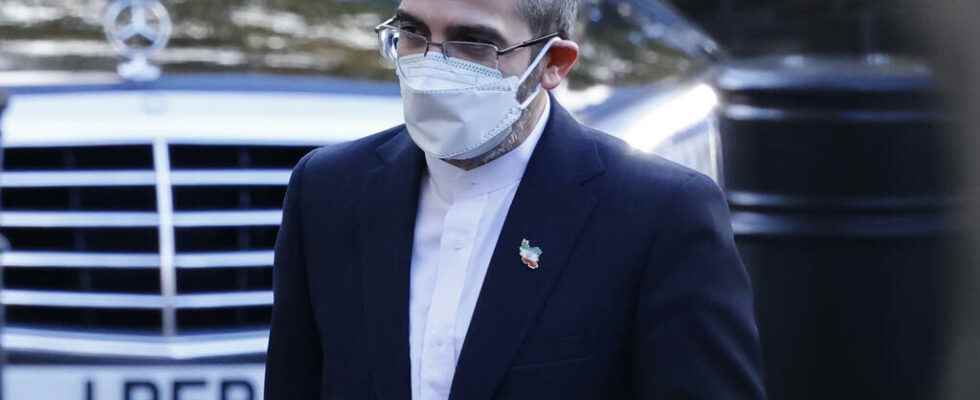Meeting under high tension this Monday, November 29 in Austria. With the resumption of negotiations between Iran and the great powers in Vienna, home of the International Atomic Energy Agency (IAEA), the goal is to try to resuscitate the 2015 agreement, which largely derailed. .
Trump’s United States left the deal so difficult to find in Vienna under Obama, and reinstated sanctions, which are choking the Iranian economy. Then Iran had gradually revived activities beyond the limits. Everything must be reviewed.
It is a strong Iranian delegation, made up of around forty members and headed by Ali Bagheri Kani, a rather harsh conservative, who agreed to go to Vienna to do this, explains our correspondent in Tehran, Siavosh ghazi.
►Read again: Tehran adopts a closed position, the negotiations promise to be difficult
The tone is rather firm, on the Iranian side: Ali Bagheri Kani, who represents a government less inclined to dialogue than under the Rouhani era, declared that the primary objective was the end of all American sanctions, and this, in a way verifiable.
He added that Iran does not trust the West and will not repeat the mistakes of the past. ” The Iranian people will not submit to military threats and economic sanctions », Promises the head of the delegation sent by Tehran.
I think it’s going to be complicated, it may take time: a year, a year and a half. Now, it can also go very quickly if there are compromises that are made simultaneously on both sides. That is to say, there has to be a reciprocal de-escalation.
Vincent Eiffling, associate researcher at the Center for the Study of International Crises and Conflicts in Louvain
Civilian nuclear program?
The Islamic Republic rejected the request for IAEA, from the United States, but also from France, Germany and the United Kingdom, who wanted the nuclear “gendarme” that is the IAEA to be able to better control Iran’s activities in this area.
Especially in the Karaj site, near Tehran. Iran produces state-of-the-art and faster centrifuges there, which allow the country to further accelerate its program to enrich uranium, an old sea serpent.
►Read also: The rise of Iran’s nuclear capacities worries
The country, today, enriches uranium to a degree that has nothing to do with a civilian program, and its stockpile of nuclear material is swelling dangerously, reports the International Atomic Energy Agency in each of its reports.
For a year, Iran has considerably limited its cooperation with the UN agency. Under these conditions, these negotiations caused by the coming to power of Joe Biden, on the Washington side, look rather difficult and could drag on.
We are faced here with an American administration which is not against an agreement, but which will have a more muscular position than that of Washington in 2014, before the 2015 agreement, and on the other side of the table, in Tehran, there too the positions are harsher and clearer.
Vincent Eiffling, associate researcher at the Center for the Study of International Crises and Conflicts in Louvain
Total failure is not excluded
At Coburg Palace, the new Iranian negotiating team will have direct talks with Chinese, Russian, French, British and German representatives, as well as indirect talks with US envoy Robert Malley.
Several bilateral meetings have already taken place this Sunday in the Austrian capital, reports our special envoy on the spot, Nicolas falez, and all scenarios are possible at this stage, including the total failure of the discussions.
For the group of powers, the stake is just as clear as for Iran: it is to ensure that this country cannot acquire the atomic bomb. There remains the idea of an interim agreement which would make it possible to lower the tension to facilitate dialogue.
► On the same subject: Washington and the IAEA deplore the impasse with Tehran
A country fiercely opposes dialogue : Israel
” Who wants peace prepares for war “. When it comes to Iran, Israeli doctrine is clear, explains a diplomatic source familiar with the matter. The Hebrew State advocates the strong way against Tehran, and tries to find allies in its crusade, translated our correspondent in Jerusalem, Sami Boukhelifa.
Tel Aviv is convinced that no dialogue is possible with Tehran. According to Israeli officials, the mullahs’ regime understands only one language: force. So the only way to make him listen to reason, so that his nuclear program remains purely civilian, is to put an armed offensive on the table, details the same source.
While the Europeans, Americans, Russians and Chinese want to give diplomacy a chance, the Israelis, ” move in all directions “. They are stepping up meetings with the great powers, with their new Arab allies in the Gulf, in the hope of setting up a large military coalition that would dissuade the Islamic Republic from responding to an Israeli attack.
But at the moment, no one wants to follow them in their campaign. And while the Israelis are already facing the Iranians through shadow battles of cyberattacks and mutual clandestine aggression, the Hebrew state does not wish to go into a declared war with the Islamic Republic alone, the source concludes. diplomatic.
